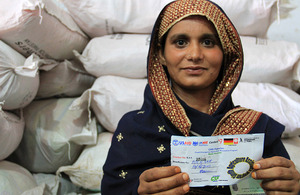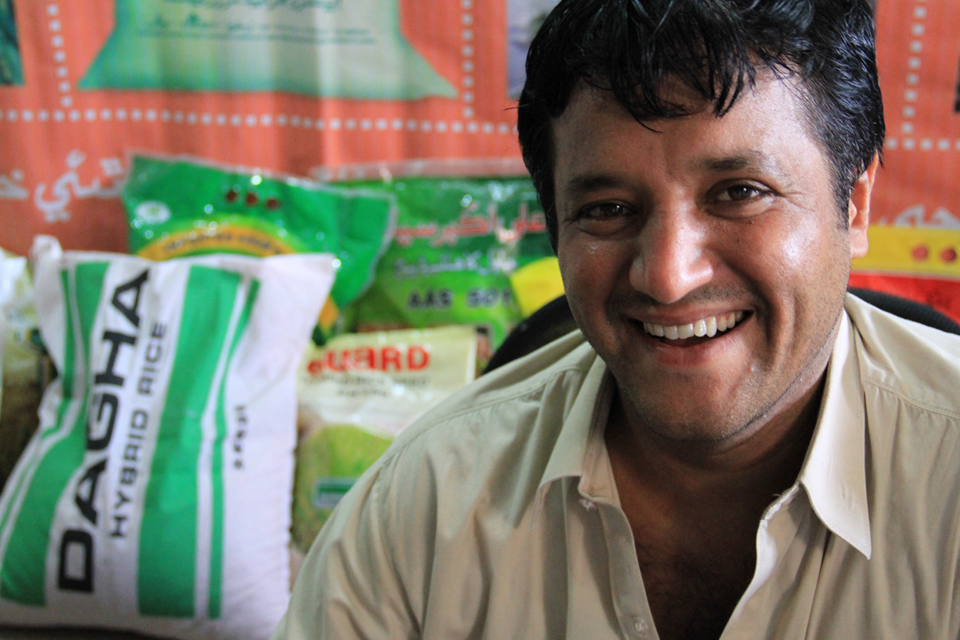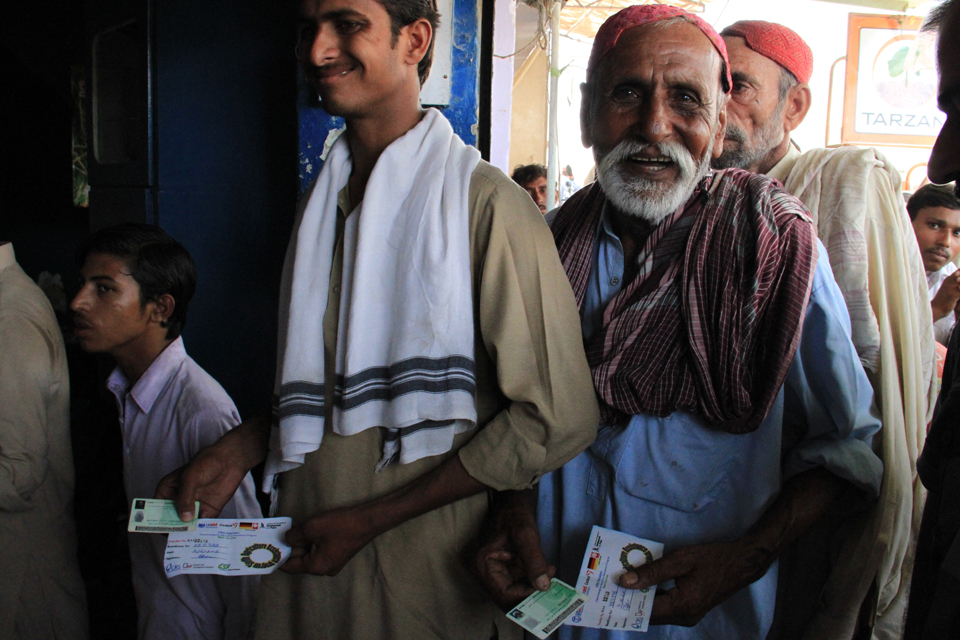Seeds of hope - Pakistan floods one year on
How UK aid has provided seeds and fertilisers to help people recover

Rahat Amanhuhha holds the voucher that entitles her to vital seeds and fertiliser. Picture: Vicki Francis/DFID
Harvesting hope for the future
Happy to get a voucher
Twenty four year old Rahat Amanhuhha is a widow with 2 children from Suleman Khan village in Sindh, southern Pakistan. She lost her home and all her crops in last year’s floods and she is very pleased to receive a voucher. That’s because the voucher in question, which is funded by UK aid, enables her to claim seeds and fertiliser so she can grow food for her family:
“I’m here today to get seeds and fertilisers from the shop. My house and belongings all vanished in the flood. We went to stay in Jhatpat then came back to a camp in Thull where we lived for 3 months, before going back to our village. When we left our home we had a good crop growing; when we came back there was nothing left, only water.”
Widespread destruction
Two million hectares of crops were destroyed in last year’s floods in Pakistan - an area the size of Wales. The UK has helped approximately 895,000 people get back on their feet and off dependency on food aid by providing seeds, fertilisers and tools. This allows them to grow their own food for their families to eat, or to sell some to earn a small amount of money and try to return to a normal life.
Changing lives
In Sindh, poor people affected by the floods receive up to 4 bags of fertiliser and 30kg of rice seeds, thanks to help from UK aid. They are given a voucher which they can redeem at any of their choice of approved seed shops.
Nanikram Tharani is the owner one such shop - Sindh Fertiliser Agency in Khandkot city.

Nanikram Tharani. Picture: Vicki Francis/DFID
“This is changing the lives of families here,” he says. ”It helps them get on their own feet again, and in a few months they’ll be able to manage their finances by themselves and not rely on aid. If there is no help people need to borrow money on high interest to buy seeds, or even get involved in worse things; stealing or robbing. We pray floods like this will not happen again to Pakistan, but appreciate efforts of people in the UK, and we’re thankful to them.”
Seeds of hope
Meanwhile, Rahat is waiting to receive her bags. A long queue of men wait patiently nearby, clutching their UK aid vouchers. Bags of seeds and fertilisers are continuously being loaded on to donkey carts and trucks.

Men stand in line with their vouchers. Picture: Vicki Francis/DFID
“I had no hope,” she explains, ”because when we came back to my village I had no home left and no crops left, so had to start begging and take charity from NGOs to take care of our children. With this voucher I’ll get 30kg rice seeds, 10kg hybrid seeds, also 2 bags DUP phosphate, 4 bags of urea, 10kg Zinc, and 8,000 rupees in cash to buy pesticides and other things.
“We work in the field of our landlord. I have to give half of what we grow to the landlord, and pay him for seeds and fertiliser as well, so only about 30% remains with us, which is only just enough for us to eat. We can’t sell any. It’s a difficult life. These seeds and fertilisers are enough for 2 acres of crops, so this will make a big difference to us. This will help us feed and clothe and get medicine for our children. I’m happy and thankful for this help from the UK.”
Facts and stats
The UK Government is helping more than half-a-million people in Pakistan recover from last year’s floods by building flood-resistant homes, restoring vital irrigation and drainage systems, creating jobs, replacing animals and fodder, as well as providing seeds, tool, and fertilisers.
UK aid is:
- building 13,400 flood resistant one room brick homes in flood affected areas, big enough to house a family of up to 8
- providing cereal seeds and tools to hundreds of thousands of people in time for the Kharif planting season
- providing kitchen gardens with vegetable seeds and tools to more than 895,000 people in Punjab and Sindh, so they can grow food for their family
- restoring irrigation and drainage systems for tens of thousands of households and farms so they can start planting for the main Kharif season
- providing approximately 744,000 men and women with cash for work schemes to help rebuild infrastructure and provide employment
- giving 12 chickens, 2 goats or fodder to 187,000 households
- providing 7,530 flood resistant seed storage containers, to prevent loss of vital food stores in future flooding
- restoring 10 acres of fish ponds so people can catch their own food